How Liz Clark turned her South Pacific sailing trip into a memoir and visual voyage
- Share via
More than 10 years ago Liz Clark left Southern California aboard a 40-foot sailboat. She had recently graduated from UCSB with a degree in environmental studies and was headed south to Panama and then across the Pacific Ocean to Tahiti. She sailed with friends and family at times but was mostly alone — eventually joined by a cat. Once she arrived in the South Pacific she spent several years sailing and surfing among the islands. She met fellow travelers and local families and became increasingly aware of the fragility of the marine environment. Her sailing log became the foundation for a memoir, “Swell: A Sailing Surfer's Voyage of Awakening,” published this year by Patagonia. She also produced a short documentary, “Steer With Your Heart: A Film from the Voyage of Swell.” Clark agreed to discuss her voyage and how she put together a written and visual memoir.
Q: “Steer With Your Heart: A Film from the Voyage of Swell” flows through topics in a stream-of-consciousness fashion. Did you have this film in mind when you set out?
A: Not really; I was more into writing about my experiences than filming them when I set out. I liked the way I could be fully present in an experience and then write about it later, versus having a camera rolling with me all the time. I did capture footage from time to time, but I didn't know how to edit or make films, so I was accumulating this footage for almost nine years until my friend Teva Perrone, who lived on the island where I was writing my book, wanted to help me turn it into a short film.
Q: What were some of the challenges of documenting something so personal?
A: I'm an introvert, so sharing my truest self in front of the rolling camera is not something that comes easily to me, but I tried to see this like any of the other challenges of the voyage and do my best to share my authentic self in hopes of inspiring others to hear their hearts’ calls. But beyond this, the challenges of documenting my voyage are many. As a captain, my first priority is making sure the boat is well-maintained, that we are safe. I must be vigilant at sea, deal with sail changes, navigation, route planning, etc. So film documentation gets a back seat to all of those things. But I realized that visual media touches a different spectrum of people than writing and can spread inspiration in a whole new way. So I did my best to gather footage of these amazing experiences little by little, in hopes of creating something that would convey some of what I was seeing and learning and feeling out there. But it's not like you get to go back to a hotel at night and shower up, charge your camera batteries for the next day, and get a good night's sleep — the adventure is nonstop, sometimes there's not enough power from the solar panels to charge the camera batteries, I'm constantly battling corrosion from being in such a harsh environment, trying to capture cool shots can be dangerous, and it's tough just trying to motivate myself to pick up the camera when I'm super exhausted from overnight passages.
Q: In the film you express being a part of the “wildness and magic” of the world. Was there a moment that sticks out that first helped you connect to that?
A: I think it was more of a gradual understanding that came out of living so close to nature and often at her mercy — frequent encounters with wildlife, the ocean’s moods, being alone out there and learning myself and my truths. And feeling freed from the norms of modern society that often felt constricting. Chasing this dream put me in so many vulnerable situations, but I always found a way through it, and that helped me understand the magic of following your heart.
Q: Do you have any thoughts for people working with video gear on sailboats or in marine environments?
A: For an amateur like me, sticking to simple, rugged equipment was essential to me actually getting the camera out to film. Almost all of the footage for this film was shot with a GoPro camera. The GoPro cameras are easy to work, they take up virtually no space, and they have always endured well in the harsh marine environments I expose them to, plus they produce high-quality images. So I would say going with a compact camera that will be easy to have with you often has its benefits.
Q: You mention in the film how you came to feel very connected to the world as a result of all the help and smiles you got along the way. Were you wary of people at the outset of the voyage? Do you remember a particular point in which you began to feel confident that you would receive the support from people you encountered?
A: Being raised in Southern California I was brought up with a healthy caution of strangers. And when I worked as a bartender in Santa Barbara before leaving on the trip, I heard every sort of horror story and reason that I should not try to go out and live this dream. I was constantly being warned of pirates, thieves, bad men. But right after crossing the border into Mexico, I encountered very friendly, helpful people. Mexican people showed me kindness and generosity and grace at every turn down the west coast. Plus, the boating community is always looking out for one another, and neither of these experiences changed as I moved through Central America and into the South Pacific. I took simple precautions like not going out alone at night in a new place, and dressing like a tomboy so not to attract extra attention, and moving away from any situation that didn't feel “right,” but I quickly realized that the overwhelming majority of people I met were going to be kind and supportive.
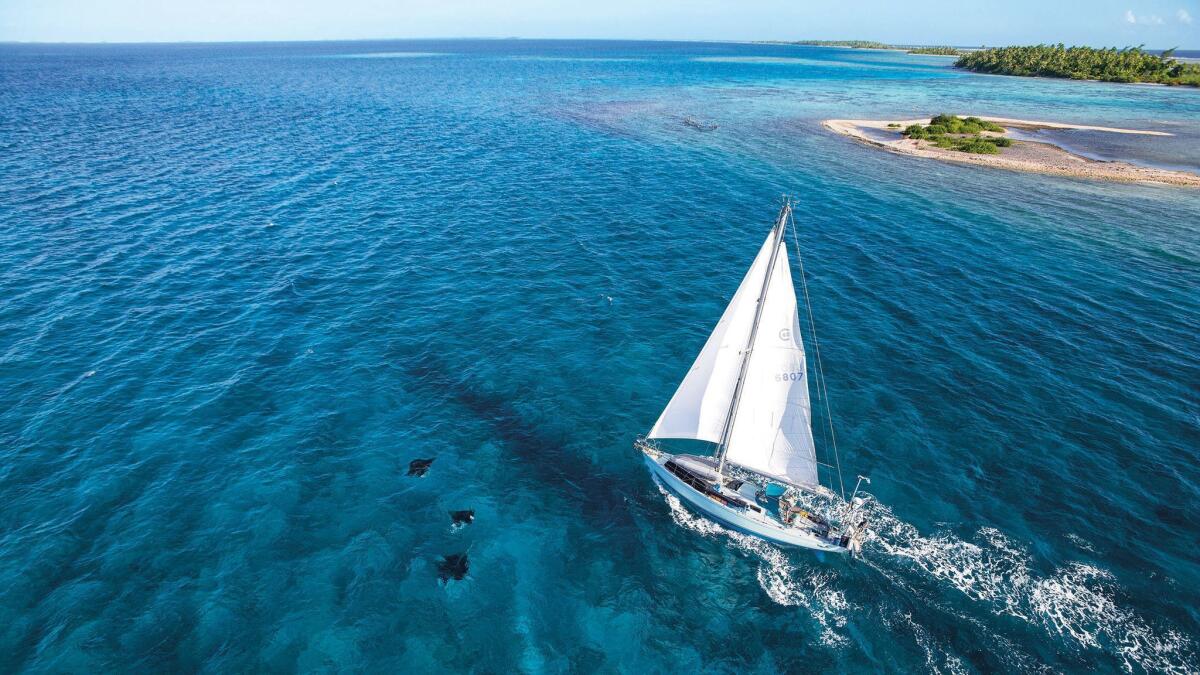
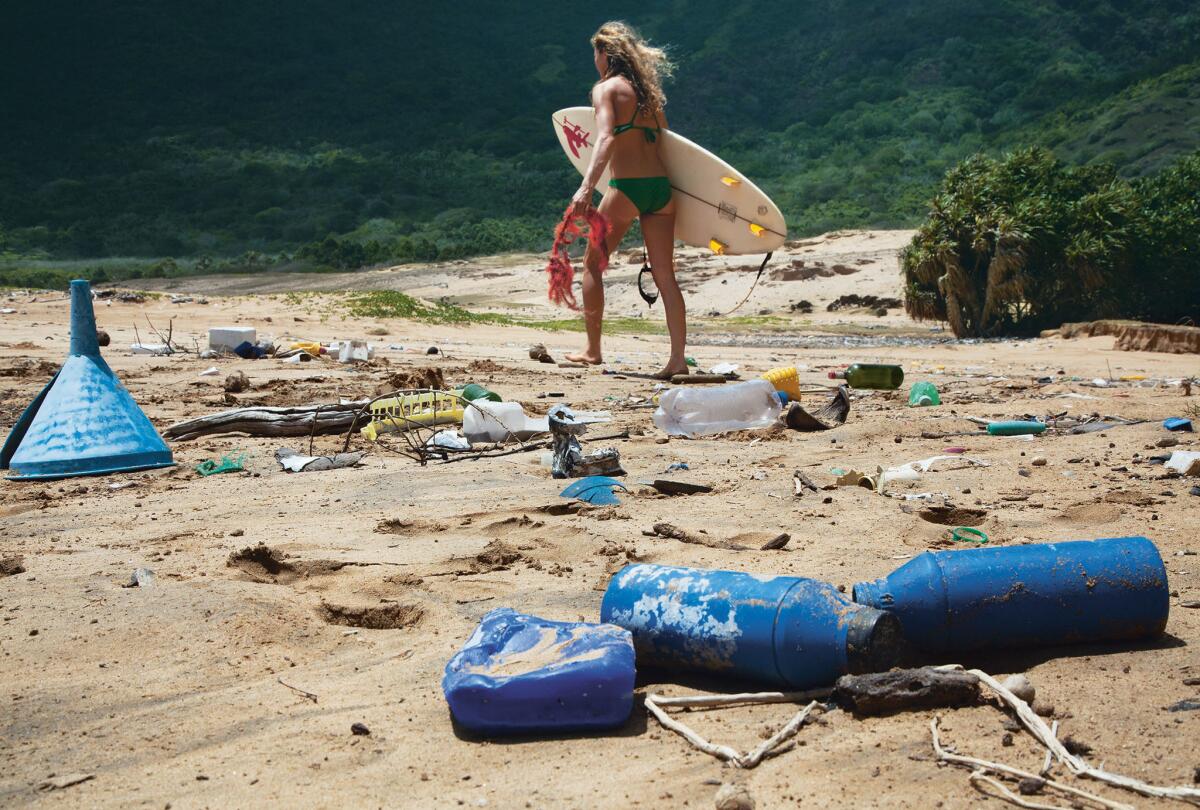
Q: Both the book and the film describe an environmental awakening. You had an academic background in science and the environment but it does seem as though your awareness of environmental issues sharpened over the course of the voyage. Can you describe some things you encountered that influenced your perception of the environment?
A: I constantly saw plastic pollution in bays and ports, as well as out at sea. Every sort — bigger items like plastic bottles, balloons, discarded fishing nets and buoys, along with smaller bits of broken down plastics that would swirl in the borders of currents. I saw overfishing and decline of fisheries — from giant tuna purse seiners, to smaller boats poaching in marine protected areas, to disregard for fish size or breeding times by local fishermen. It made me realize how selective we must be as seafood consumers if we want our grandchildren to be able to enjoy seafood. I’ve watched coral reef health decline in the Pacific — drastically in the last five years with the bleaching events from our warmer, more acidic oceans due to climate change. And I’ve witnessed sea levels rising, and island populations having to mitigate higher tides and salt water contaminating their groundwater sources, to facing having to leave altogether. These are all reasons that I’ve chosen to use my voice more and more for activism for our planet and for these people who are being affected, but don't have a voice to influence change. Not everyone can experience what I've seen first-hand, so I feel a responsibility to spread awareness and be a leader in the movement for sustainable, earth-conscious living.
Q: Many coastal sailors consider longer voyages. You actually did it and have faced a multitude of dangerous moments — and mechanical issues. Have your fears eased with experience? Was it helpful to sail with friends and family in the beginning?
A: Yes and no. I’m certainly more confident as a captain and I know the ins and outs of my boat now, which makes going to sea less scary. And I've proven to myself that I will find a way to deal with whatever comes up mechanically or otherwise in terms of equipment. But my sea miles have also taught me that it's important to maintain a sincere respect for the ocean. Without this healthy dose of “fear” I think people can get too comfortable and cut corners. I've seen how quickly things can go wrong, which keeps me on my toes, making sure to prevent problems and prepare as much as possible before leaving safe harbor. And yes it was super helpful to have different friends and family with me at the beginning as I was gaining confidence as a captain.
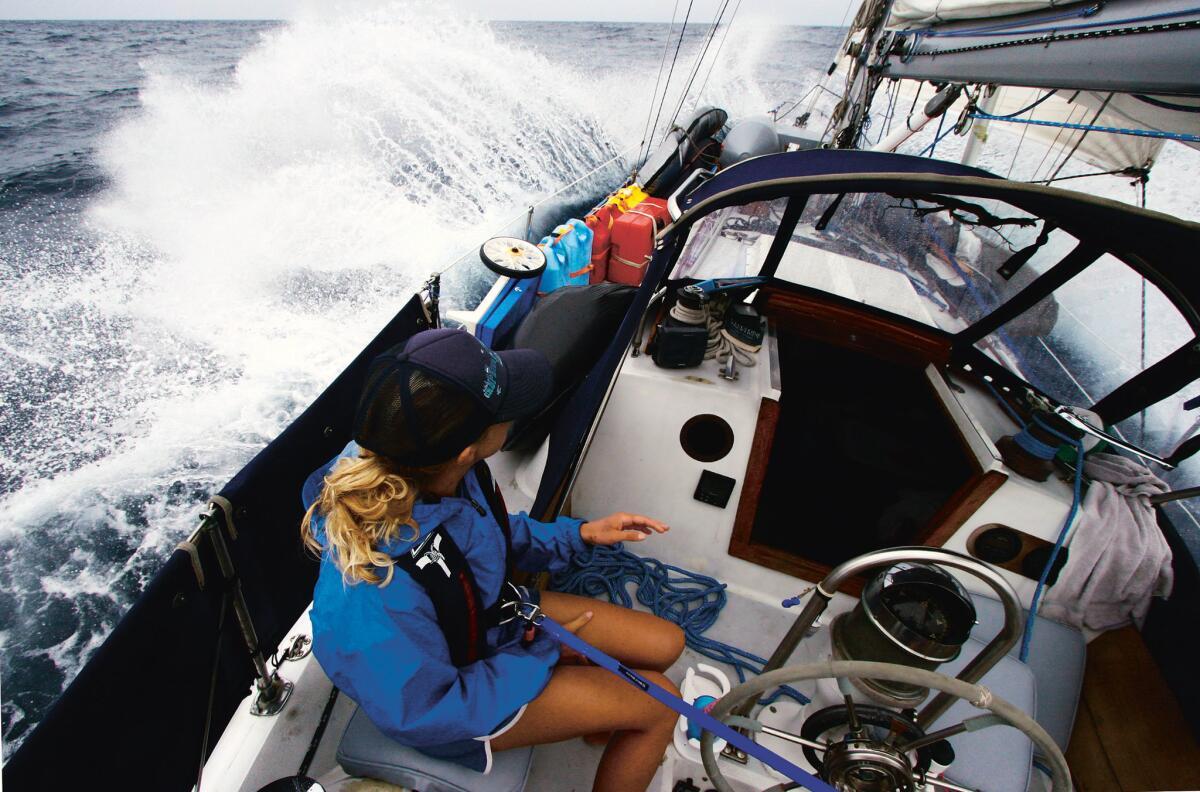
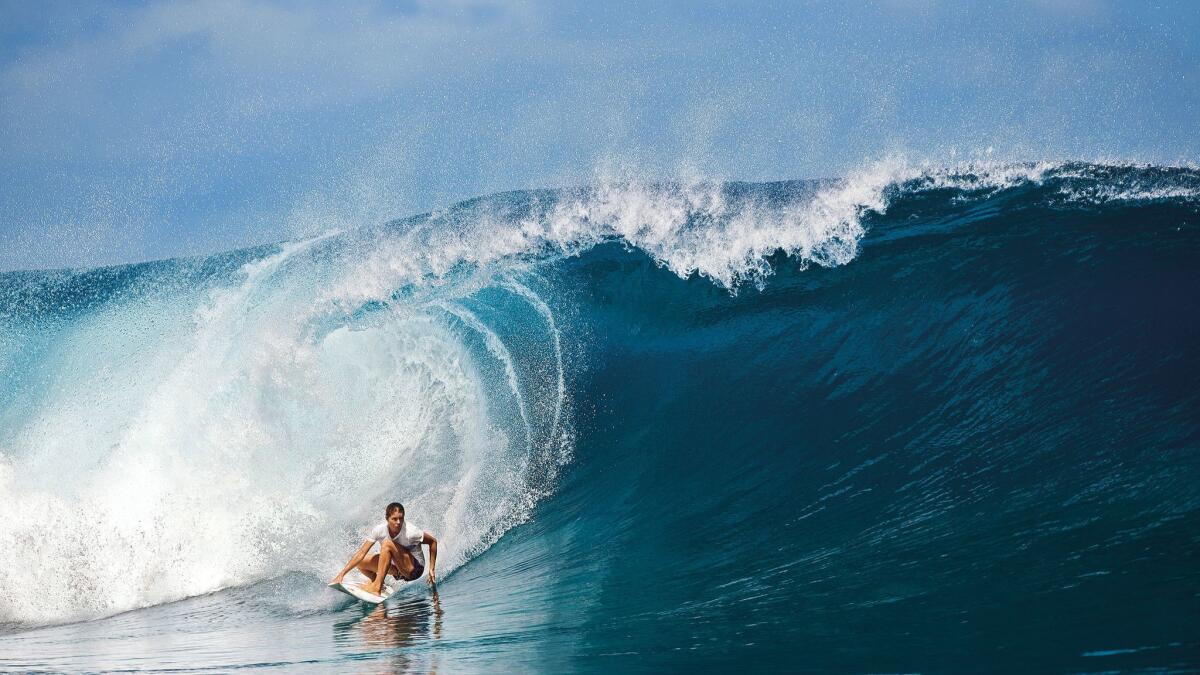
Q: You sailed to Tahiti, paddled out at Teahupo’o and describe a wonderful session with Raimana. That’s pretty amazing. What was the most surprising thing about Teahupo’o?
A: Yea, having Raimana's encouragement was everything out there. The most surprising thing to me about Teahupo’o was the amount of water that moves through the wave and lineup — it's incredible — and how the swell just seems to spring up like mountains out of nowhere just in front of the break because of the way they hit the reef shelf out of very deep water.
Q: Both the book and the film relate a voyage that is enlivened by personal growth. Was there a point when the narrative became clear to you?
A: Early on in the voyage, I realized that I wouldn’t succeed at my sailing and surfing dream unless I faced the things about myself that I needed to work on, so personal growth became a big focus of the journey. Living on the edge of safety and certainty all the time pushed me to seek to understand my connection to the universe and alignment with my truth. In seeking self-awareness and doing the work on myself, I felt connection to something greater than myself that binds all of us together, and soon intuitively felt that my growth was/is a big part of my “purpose” here on Earth, and everyone's purpose. So it felt right to make this a significant part of the narrative.
Q: Can you describe your writing process?
A: My writing process for the book started with a lot of procrastination, haha ... and by looking back through my blogs and personal journals and chronologically piecing together significant stories that either played into the personal growth theme, or into the adventure, surfing, sailing, love, or the story lines about my relationship with my parents, etc. Thankfully I worked with a fabulous editor, Sharon Avrutick, who really helped me shape and structure the narrative and chapters effectively. Getting going was really a challenge. I had a huge amount of writing that I just squashed together and then had to trim and edit, and fill in here and there to make it connect and flow. I wrote the book mostly on my boat, and at a desk in the forest that my partner built for me. I would surf in the morning, then try to write until I couldn't sit still anymore.
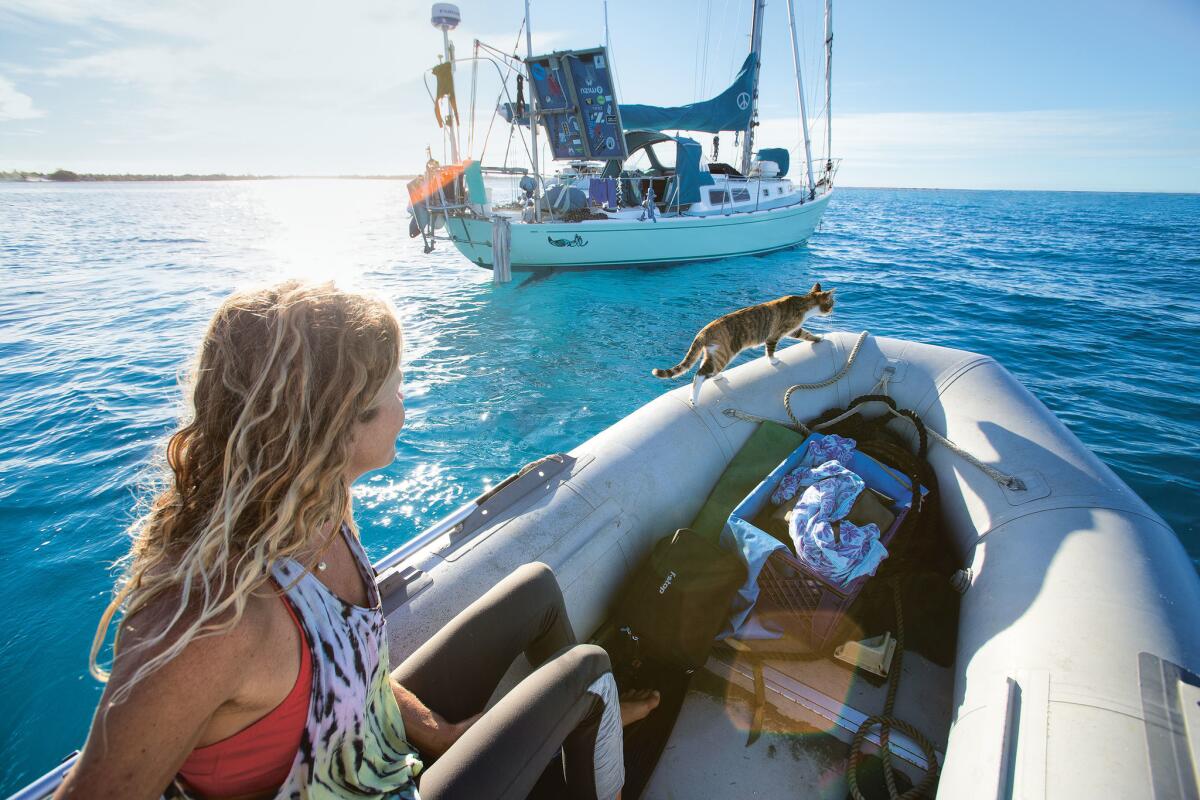
Q: You describe overcoming significant relationship issues and being scared for your physical well-being. You solved it with courage and the support from those around you. How did that experience affect you?
A: That experience affected me enormously. It gave me so much compassion for other women (and men) in that kind of situation, because if someone as independent and capable as me can find myself in that nightmare, anyone can. It helped me stop judging people I cross in everyday situations because I realized that I can never really know what someone is going through. This experience also helped me understand what it really means to love myself, and love someone else too. I also gained a huge amount of compassion for other beings in situations of vulnerability. It was one of the reasons I stopped fishing and became vegan (I only eat fish very rarely now), because I couldn’t bear to put another being through the fear that I experienced in my situation — even a fish. Going vegan is by far the best thing I've ever done for my own heart, for the animals, for the earth, the ocean, and for my health, so I'm grateful this gave me the extra push to stop eating meat just because it “tastes good.” I understand what it's like to feel like I'm at the mercy of someone's violence, and don't wish that upon any being. Eating in alignment with my truth has made my life so much richer!
Q: What are your plans for the future?
A: It’s been a busy, stressful last couple years getting this book finished followed by a fast-paced, 24-stop book tour, so for the moment, my only plan right now is to get back to my boat, slow back down, get back to nature, and put my health and body first. I know I will do more adventure sailing, but I’m not sure when or where yet.
Sign up for our Book Club newsletter
Get the latest news, events and more from the Los Angeles Times Book Club, and help us get L.A. reading and talking.
You may occasionally receive promotional content from the Los Angeles Times.







